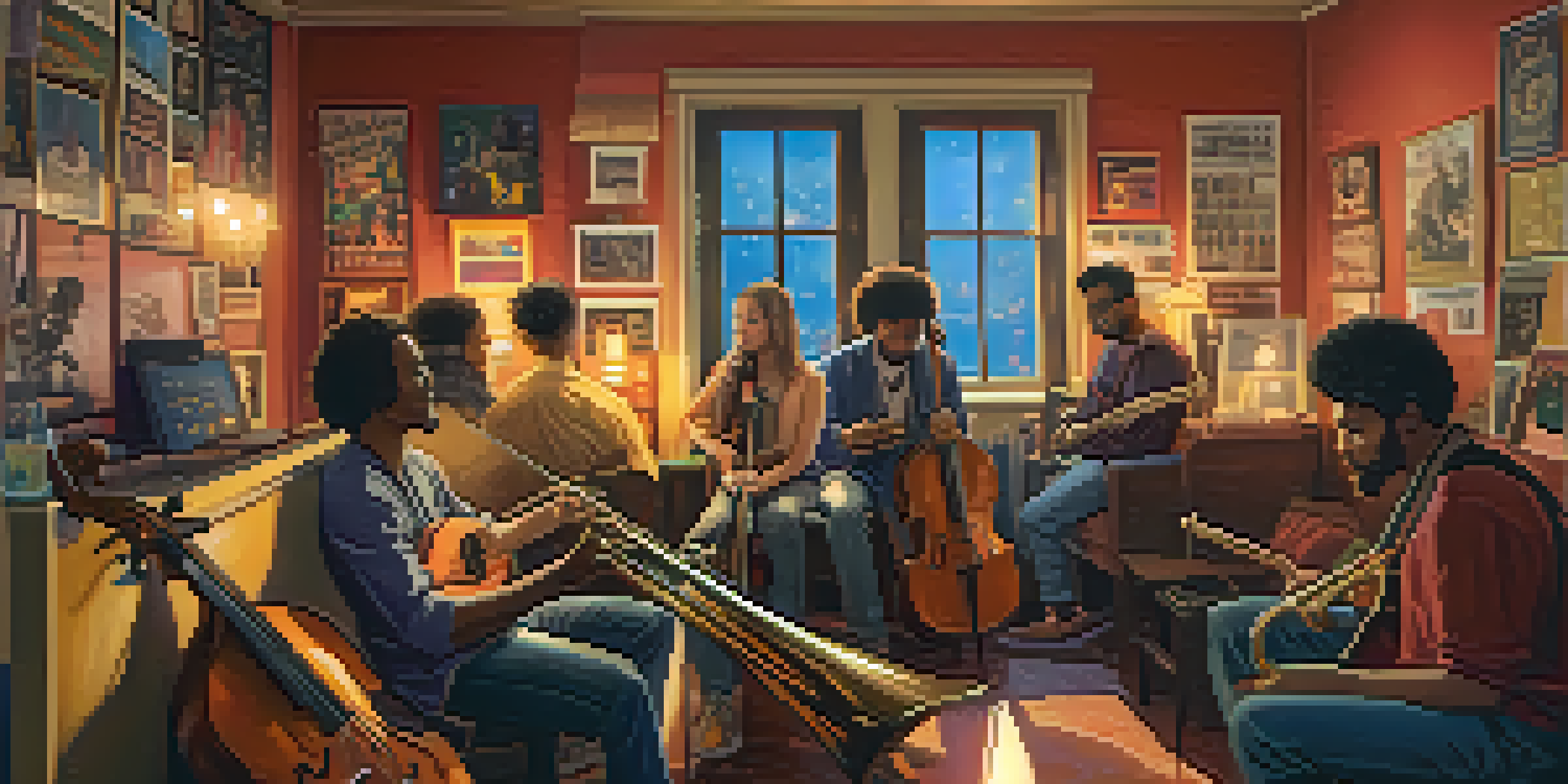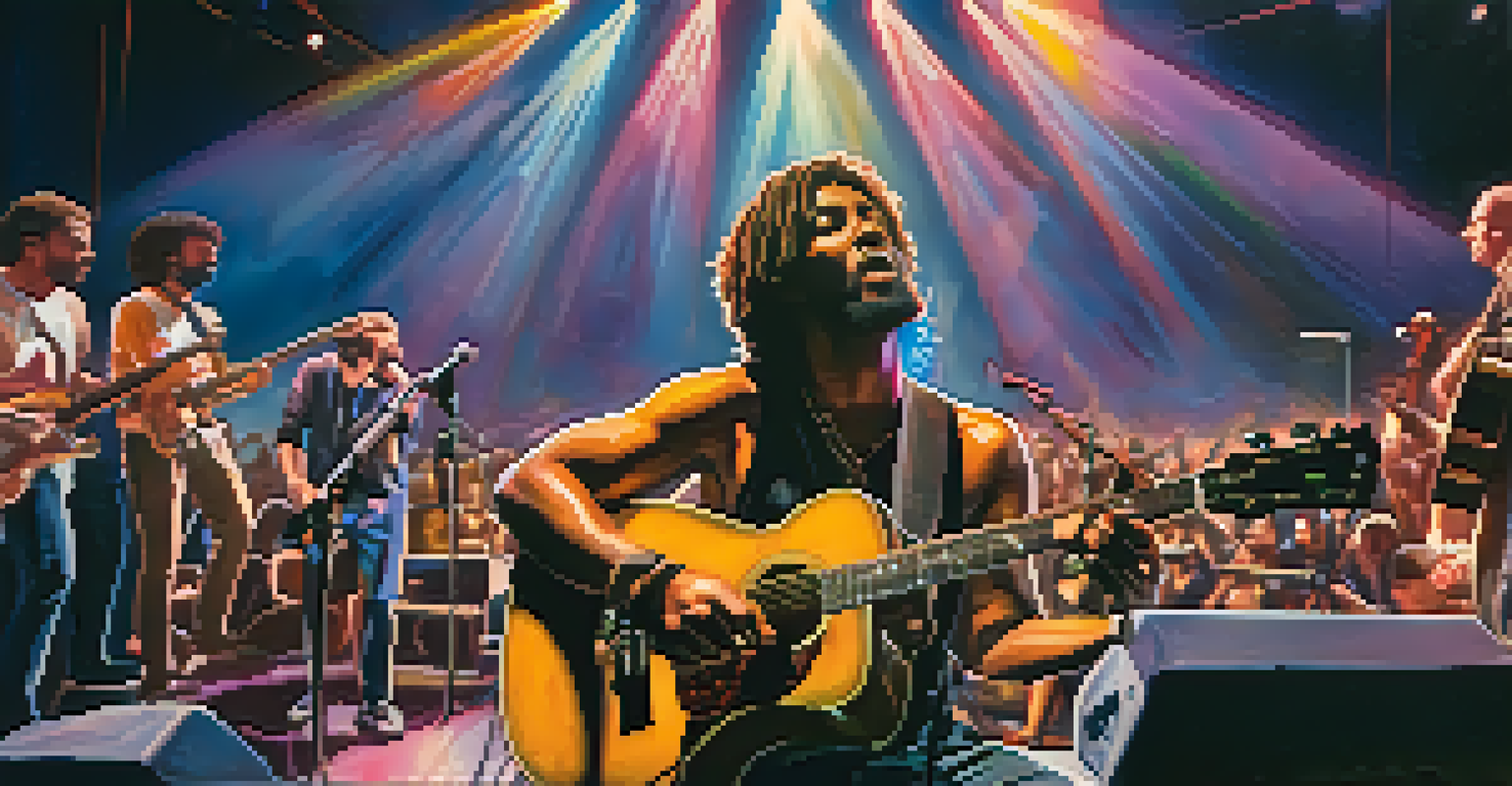Documentary Films and Their Impact on Music Genres

Understanding the Role of Documentaries in Music
Documentary films have long been a vital medium for storytelling, and when it comes to music, they serve as a bridge connecting audiences to the artists and genres they love. By showcasing the history and evolution of various music styles, documentaries help viewers understand the cultural and social contexts that shaped them. For instance, films like '20 Feet from Stardom' highlight the often-overlooked contributions of backup singers in the music industry, revealing layers of complexity within popular genres.
Documentaries are the bridges that connect audiences to the soul of music.
Moreover, documentaries often provide an intimate glimpse into the lives of musicians, allowing fans to see the human side of their idols. This emotional connection can deepen appreciation for the music itself, transforming listening experiences into something more meaningful. When audiences learn about the struggles and triumphs of their favorite artists, it fosters a deeper understanding of the music's roots and influences.
Ultimately, documentaries serve not just to entertain but also to educate, bringing viewers closer to the music they love. By blending storytelling with compelling visuals, these films can spark interest in genres that might otherwise go unnoticed, expanding the horizons of music appreciation.
How Documentaries Influence Emerging Music Genres
As new music genres emerge, documentaries play a crucial role in shaping their identity and reception. They spotlight groundbreaking artists and their unique sounds, often paving the way for wider recognition. For example, the documentary 'Rising Tide: The Story of the New Wave' helped bring attention to the New Wave genre, showcasing its eclectic style and cultural significance during the 1980s.

Furthermore, documentaries can set trends by highlighting specific movements or styles. When a film captures the spirit of a genre—like the raw energy of punk rock or the intricate rhythms of Afrobeat—it can inspire a new wave of artists and fans alike. This ripple effect often leads to collaborations, festivals, and a renewed interest in the genre as a whole.
Documentaries Connect Artists and Fans
Through storytelling, music documentaries deepen audience appreciation by revealing the personal journeys of artists.
In essence, documentaries not only chronicle the evolution of music but also actively participate in its development. By presenting narratives that resonate, they can ignite passion and creativity in both artists and audiences, ultimately influencing the future landscape of music.
Documentaries That Revolutionized Music Genres
Several documentaries have left a lasting impact on the music scene, redefining genres and influencing public perception. For instance, 'The Last Waltz,' directed by Martin Scorsese, not only documented The Band's farewell concert but also elevated the concert film genre. This film showcased the blend of rock, folk, and blues, illustrating how diverse influences can come together to create something unique.
Music is the shorthand of emotion.
Another notable example is 'Searching for Sugar Man,' which tells the story of Sixto Rodriguez, an American musician who became famous in South Africa without knowing it. This documentary not only revived interest in Rodriguez's music but also shed light on the role of folk music in shaping social movements, inspiring a new generation of artists to explore similar themes in their work.
These documentaries serve as crucial cultural artifacts, preserving the essence of musical movements and ensuring that their stories are told. By documenting these pivotal moments, they help solidify the genres' legacies and inspire future musicians.
The Emotional Connection Between Documentaries and Music
One of the most powerful aspects of music documentaries is their ability to evoke emotions, drawing viewers into the artists' journeys. Music has an inherent capacity to connect people, and when combined with storytelling, it becomes even more impactful. Documentaries like 'Amy' and 'What Happened, Miss Simone?' explore the lives of iconic musicians, inviting audiences to empathize with their triumphs and struggles.
These emotional narratives often lead to greater appreciation and understanding of the artists' work. For instance, learning about Amy Winehouse's personal battles deepens the listener's connection to her music, turning simple listening into a profound experience. This emotional resonance can inspire fans to explore the themes and messages embedded in the music.
Cultural Preservation Through Film
Documentaries help preserve musical traditions and cultural histories, ensuring that unique stories are not forgotten.
Ultimately, the emotional connection fostered by documentaries enriches the listening experience, creating a bond between the artist and the audience. This connection can lead to a lasting impact, encouraging fans to delve deeper into the music and its underlying messages.
Documentaries as a Tool for Cultural Preservation
Documentaries serve as vital tools for preserving musical traditions and cultural histories. In a rapidly changing world, these films document the nuances of various genres, ensuring that their unique stories are not forgotten. For example, 'The Blues' series by Martin Scorsese showcases the rich history and influence of blues music, highlighting its role as a foundational genre for many contemporary styles.
By capturing the voices and stories of artists from diverse backgrounds, documentaries help to maintain a connection to cultural roots. This preservation is especially important for genres that face the risk of being overlooked or marginalized in mainstream music scenes. By shining a light on these genres and their histories, documentaries keep their legacies alive.
Moreover, such films can inspire future generations to appreciate and engage with their cultural heritage. By showcasing the beauty and significance of these musical traditions, documentaries encourage audiences to explore and celebrate their own cultural identities through music.
The Role of Technology in Music Documentaries
Technology has revolutionized the way documentaries are made, allowing filmmakers to tell stories in more engaging and innovative ways. With advancements in filming techniques and editing software, documentaries can now incorporate stunning visuals and immersive soundscapes that enhance the viewing experience. This evolution has made music documentaries more appealing and accessible to broader audiences.
Streaming platforms like Netflix and Hulu have also changed the landscape, making a wide array of music documentaries readily available to viewers. This ease of access means that audiences can discover niche genres and artists they may not have encountered otherwise. For example, films like 'Hip-Hop Evolution' have introduced many to the rich history of hip-hop culture and its impact on society.
Technology Enhances Music Documentaries
Advancements in technology allow filmmakers to create more engaging music documentaries, making them accessible to wider audiences.
In this digital age, technology not only enriches documentaries but also facilitates the sharing of music stories across the globe. Through social media, viewers can engage with filmmakers and artists, promoting discussions around the genres and the impact of the documentaries that feature them.
The Future of Documentaries and Music Genres
As the world of music continues to evolve, so too will the role of documentaries in shaping and reflecting these changes. With emerging genres and innovative artists constantly pushing boundaries, there is no shortage of compelling stories to tell. Documentaries will likely continue to serve as a platform for diverse voices, shedding light on underrepresented genres and artists.
Moreover, as audiences become more engaged with music on a global scale, documentaries can play a crucial role in fostering cross-cultural understanding. By exploring the connections between different genres and their cultural contexts, these films can help bridge gaps and promote appreciation for a wide variety of musical expressions.

In conclusion, the future of documentaries in the music realm looks bright. As storytellers continue to explore the intersections of music and culture, audiences can expect to engage with rich narratives that not only entertain but also educate and inspire.